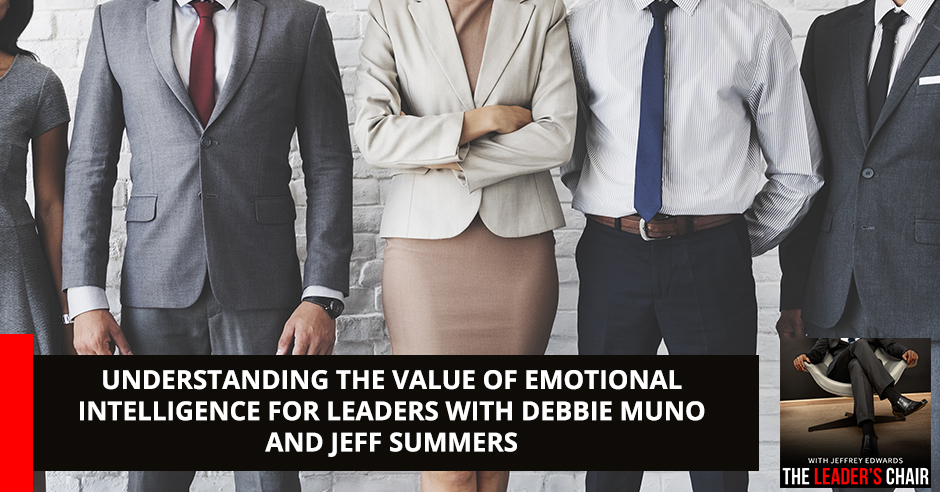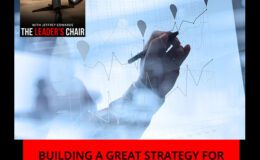
We all know what emotional intelligence is — but what does it mean to be an emotionally intelligent leader? In this episode, I speak to two experts from Genos North America — Debbie Muno and Jeff Summers — to take a deep-dive into the science of emotional intelligence.
About Debbie Muno and Jeff Summers


Debbie Muno and Jeff Summers are the Managing Directors of Genos North America.
Building on their 30 years of corporate experience working with psychometric assessments, they equip coaches, consultants, trainers, and organizational development specialists with the tools and education to advance Emotional Intelligence in their work.
Check out this episode if you want to learn:
- How to tap into the under-appreciated power of emotional intelligence
- Why you need to work with your emotions — not against them
- What authentic leadership looks like
🎧 Listen to the podcast here:
Understanding The Value Of Emotional Intelligence For Leaders With Debbie Muno And Jeff Summers
What has been the impact of your work?
DM: We are so fortunate to collaborate with people globally to make people’s lives better. That sounds like this broad, overarching statement, but emotional intelligence is about being smarter in the ways that we perceive and understand (things that we) reason with. We use our emotions so that we can be more productive with the people around us.
That sometimes sounds like purely a work thing, (but) it’s not — it’s about having productive, personal relationships. Productive meaning ‘moving toward the positive’. It’s far better to be engaged in communication in which both people feel heard, valued, appreciated, understood, and listened to, (rather) than the opposite of that.
We’re working with people such as yourself to be able to get up-skilled, so that you can go out and make a difference with all of the clients with whom you interact. You are the one who changes the game for people’s businesses. We have a small part in it, (and) that small part is humbling.
When they’re assessed (or) participate in a training program, (our clients) learn to become more self-aware and develop an empathy muscle, make decisions that include their feelings and the feelings of the people around them, which means they make a better decision (and) get more buy-in.
Jeff, you have a sales perspective. How have you combined sales with emotional intelligence?
JS: There are a couple of situations that stick out (to me, which) connect back to what we do.
It was 1989 (when) I went to buy my first new car. I had three different car dealerships to look at. The first two were the typical feature-benefit, and I never made the connection (with the salespeople). (Then) I went to the third place. Mark, the salesperson, said something near the end. I’ll never forget this — he said, ‘We’re seeing some challenges intermittently with some of the new electronic work. In case you do purchase a car here, and we need to (get some work done on the car), I’d like to introduce you to some of our people, so you can see what’s going on.’

Emotional Intelligence: When we talk about emotional intelligence, we talk about emotional behaviors. It has a lot to do with what people do or don’t do in their interactions with others.
Back in the day, (it was about) ‘show no weakness’ and ‘have an answer for everything’. (Mark) was somebody who was being vulnerable and transparent (with me). That was the person I bought the car from. There was trust (because it) was a real person.
As (I) got more into emotional intelligence, that story came through crystal clear. It’s been going on forever, it’s just that now there is more science to back it up.
How do you define emotional intelligence?
DM: In our world, we talk about observable behaviours when we talk about emotional intelligence. This has a lot to do with what do people do or (don’t do) in their interactions with others. Emotional intelligence is dialing in, and becoming aware of how we feel at any given moment in time, (and) reasoning with that. (That means) using that information to make decisions, being able to understand how other people are feeling, and this notion of adding how we feel into everything that we do.
In my time coming up in the workplace, I was told repeatedly, ‘Check your emotions at the door. It’s a business decision.’ What we now know is that, first of all, our emotions live in a part of our brain called our limbic system. The last time I checked, all of us take our brains with us everywhere we go. There’s no way to extract that, and set it in a cubby until you come back at the end of your workday. Our emotions are part of us, and part of our humanity. Every conscious moment we have, they’re present.
We can’t leave them out — so what do we do?
DM: We need to understand and work with them, not have them work against us. That’s what the essence of emotional intelligence is.
If you think about (one of the best people) you’ve worked for, you felt like you were at the top of your game. You were super motivated to be with them (and) you continually brought the best version of yourself. It was a safe place (and) you could make a mistake. That person would be demonstrating a lot of emotional intelligence in the way that they communicated with you.
We all have been around people who we would describe as the worst person we’ve ever worked for or with — that terrible boss, or teammate who was incredibly difficult. These folks have the absence of emotional intelligence. They are demonstrating behaviours that we would call ‘unproductive’. They made us feel like we were being berated, (or that) our ideas are worthless. That would be on the other end of the demonstration of emotional intelligence.
If you think about two people in your life who are like that, the person you described (as) your best is somebody who behaved in a way (that) was emotionally intelligent. They used those emotions that all of us have in our heads in a way that was productive and collaborative.
It’s impossible to leave (our emotions) out. The best thing to do is to have them become an asset. For them to become an asset, we have to work on (them) — like swinging a golf club, or learning any skill. When we do, we can forge strong relationships professionally and personally.
We bring our emotions everywhere we go. We need to and work with them instead of against them. Share on XSo the concept of being a different person at work and at home doesn’t apply.
DM: No. You have those emotions, and they come with you everywhere you go.
If you’ve ever had a bad day, you tend to bring that home with you. Even when you’re actively trying to engage with your family, (it) is omnipresent. That worry, frustration, anger — whatever that emotion is — (it’s) with you.
If you can learn how to work with that — it’s not that it becomes utopian. We experience these negative emotions, but (with emotional intelligence), we are more skilled at experiencing them, responding to them in a productive way, and (being) resilient.
Beyond having a more pleasant evening, (emotional intelligence) has a lot of implications on your emotional and physical well-being. Reducing occupational stress and increasing resilience (can) do a whole lot for your holistic being.
Jeff, when you were describing your experience buying a car, it was the fact that the salesperson admitted something could go wrong that made you buy from that company. Do you find your clients are still refusing to show fallibility?
JS: I’ll use an example (going back to) 2002. We were living in Tampa, Florida. We’ve all been to those home shows, where there (are) aisles and aisles of booths. There was one booth that I had done some research (on, and) I wanted to check some things out. I was standing near the end of the aisle, (and) I could see the booth I needed to get to. There was a person behind (the) desk — a rep or a salesperson.
I could just tell by the body language of both people (that the salesperson was trying to close a deal). My first (feeling) was, ‘That’s not what I want. I don’t need the information that bad — I’m not going to go.’
One of the most important learning experiences from that (came) three or four months later. I was on the other side, doing a trade show, (and) I was that salesperson. Moving forward, (I decided) to be a different kind of person. I respected people as they came up — I did not want to be that person that I saw back in that Tampa Home Show.
We’re humans. When we feel that pushback, we push back, and nothing good comes out of it. It’s a different way to answer your question.
How does that show up in leadership?

Emotional Intelligence: There is a direct connection between emotional intelligence and many of the core values that companies seek.
JS: There’s this notion in leadership that you have this armour around you – you must answer everything, and this is the way that it is. It’s like this Teflon exterior, when the reality is (that) leaders are human beings. By nature, human beings are not perfect. Attempting to be perfect is elusive. We are humans, and we are not static — we grow.
Someone who ascends into a role of leadership has grown into that role. You don’t just start there (from) day one — you grow into that role, which is proof that we don’t know things. We learn things.
DM: I was listening to Jeff talk about that notion of sales — (to) always be closing — which inevitably (feels) adversarial. It is some battle of the wits: ‘Who’s going to win here and close the sale?’ When we put emotional intelligence into the recipe of sales or leadership, it eliminates this notion of (the) adversarial. When we are smarter about using our emotions, and the emotions of other people, we can then co-create. We can collaborate to get to where we want to go.
What does that look like in a leadership role?
DM: When someone asks you something, and you don’t know the answer, (there) is an opportunity to say, ‘Jeff, that’s a good idea. I don’t know the answer to that. Why don’t we research it together and let’s come back next week at the meeting?’
As humans, we can’t know everything. (It’s about) co-creating the solution and showing some humanity — which is authenticity — because none of us are perfect.
When salespeople work to co-create a solution, we move towards (facilitating a sale) so that we can implement (a product) into (a client’s) system, life, home — whatever the case may be. That notion of laterally walking together is a whole different mindset than (being at) the opposite side of the court.
I think that’s what emotional intelligence does. It recognizes, ‘None of us have all the answers, but if we work together, (we can) co-create.’ It’s like horsepower. One horse pulls one horsepower, but two horses pull four horsepower. We get to engage the horsepower of the people around us.
How often do you hear people dismissing emotional intelligence, saying ‘I am who I am’?
DM: Jeff mentioned that we live in Tampa. I’m a bit proud that the Tampa Bay Buccaneers won the Super Bowl this 2021, with Tom Brady as our quarterback.
Leaders are human beings and human beings are not perfect. Attempting to be perfect as a leader is elusive. Share on XThe interesting thing about Tom Brady is (his) way of living to bring the best version of himself to the field every day. What I mean by that is his workout, hydration, nutrition and sleep routine. He talks about these things readily. Some people might say, ‘I like to have my fried food, my soda. I want to have those three beers on a Friday night.’ Tom Brady is saying, ‘I’m going to do things slightly differently (so) I can be the best that I can be when I’m on the field.’
I think, in many respects, this is what the skill set of emotional intelligence is. When (someone says) ‘I don’t have time to be nice’ — somebody might not perceive that they have time to ‘be nice’, but they are being (nice) anyway. They’re sending an email anyway, putting forth an agenda, communicating. It’s not taking any more or less time to do that in a way that is more emotionally intelligent.
If you’re going to be communicating with these people around you, why don’t you do it in a way that puts them in an environment where they get to be Tom Brady — where they can bring the best versions of themselves?
And what’s the science behind this?
DM: If you (think) about the worst boss you’ve ever worked for, it’s pretty awful. We feel frustrated, worried, and stressed. Maybe we don’t know what version of them is going to show up. They’re temperamental.
Your body is trying to survive that day. (It’s in) what we call ‘threat circuitry’ when that happens. We’re not bringing the best version of ourselves — (instead), we’re trying to cope our way through the day.
Conversely, when we’re in a (positive) work environment, that’s called ‘reward circuitry’. We feel valued, appreciated, and meaningful. When we’re feeling that way, we have a heightened sense of critical thinking and problem-solving. That’s where ROI happens.
Underneath that, the amygdala (part of your) brain (is experiencing) everything in the world, and it’s designed to keep you alive. Stuff that looks dangerous is deemed dangerous, (and) you land in threat circuitry. When we’re in a good environment, the biology of our brain sets us up to be in reward circuitry.
I always find it interesting if a leader says, ‘I don’t have time to be nice’, because you have time to be something. Emotional intelligence is about being smart with your emotions and the people around you. Why not learn the specific skills that set your team up to have the best ideas, the best problem-solving capability, and be the most creative and collaborative? We might as well (act) in a way that creates ROI for us.
How does this show up in your own clients?
JS: One area that’s very crystal clear is when a company is trying to hone in on culture and core values. There’s a direct connection between emotional intelligence behaviours, core values, and the cultures that companies seek.
Another area that’s easy (to identify) is when organizations have a job description. There are going to be things about collaboration, having people engaged, employer of choice, being present, being resilient, and being able to bounce back.

Emotional Intelligence: Emotional intelligence is a driver of outcomes, whether those outcomes are in sales, leadership, or personal relationships.
Sometimes, companies will (ask us), ‘I get emotional intelligence, but how does it connect back to our organization?’ Those are (the places where it connects).
Emotional intelligence is a teachable trait; how do you convince clients of this?
DM: Emotional intelligence is (a) demonstrated behaviour. It is a constant process of learning, just like learning any other skill. In some respects, (it) might remind people of (being) in middle school, learning a new language.
Initially, you only learn a handful of nouns or how to conjugate a verb. In short order, you’re putting sentences together, and then you’re putting paragraphs together. (Finally), you’re reading and speaking fluently.
Emotional intelligence is no different. What we’re doing is providing these skills. You don’t learn them all at once. The idea is to find a couple of these skills that are important to you.
Jeff has mentioned a couple of things like being authentic, which people think means telling the truth. Certainly, that is a big piece of authenticity, being genuine — (but) it is (also) very specific things like honouring your commitments, expressing how you feel to the right people, to the right degree, in the right place, at the right time. These are very specific things that we can learn how to do more of.
You mentioned we can pick a few areas of emotional intelligence that matter most to us. What does that look like?
DM: The great thing about emotional intelligence is (that) it’s all interconnected. We can pick two of three of these skills to get good at. When we do that, we often bring a lot more of those skills along, because they’re like a collateral benefit.
About two weeks after (Jeff and I completed our certification), we had this very profound conversation, (asking) ‘do you look at the world completely differently? Do you engage in every conversation differently? Are you aware of what you type into an email in a whole different way?’
Emotional intelligence is a set of demonstrated behaviors. They are skills. And just like any other skill, they can be learned. Share on XIt was a lot like somebody threw the blinds up after all these years. I thought, ‘This is great. Why did I not know this when I was 20, instead of 50?’ When you do learn that skill, it’s constantly applied. You get better at it. Other skills come along with it. It is not a destination — it is a journey, and a very rewarding one, not only for you as the person doing the growing, but for every person around you.
What has the experience been like for you, Jeff?
JS: If somebody said to me, ‘Jeff, you need to do a better job building relationships with your team,’ that would be me getting a photograph of a great chocolate cake with icing on it, (but) no ingredients, recipe (or) utensils. What I had to do for a living was make that chocolate cake with that icing.
When we hear (about clients looking to build) relationships, there are a lot of things that go (into that, and) that’s the stuff that we’re doing. It’s like the ingredients, (we’re asking): ‘What’s more important? What’s less important?’ We’re opening the hood and giving people an opportunity to get that information (about themselves).
There are good, talented salespeople (who are) good at what they do, not because of the number that they log for their monthly productivity. That number is because of their relationships with their prospects and clients. They’re getting more referrals because you can trust this person.
It’s the same thing with great leaders in organizations. You’ll hear all the time (that) people are clamoring to get into a department because of the person who’s leading (it), or because of the team that you’d get to be on. That’s not because of what’s in the column on the spreadsheet. The end product is because of the collaborative relationship. It’s because of the emotionally intelligent relationship.
📌 Important Links:
- Genos North America
- Jeff Summers – LinkedIn
- Debbie Muno – LinkedIn
Love the show? Subscribe, rate, review, and share!
Join The Leader’s Chair Community today on Facebook and Twitter.





